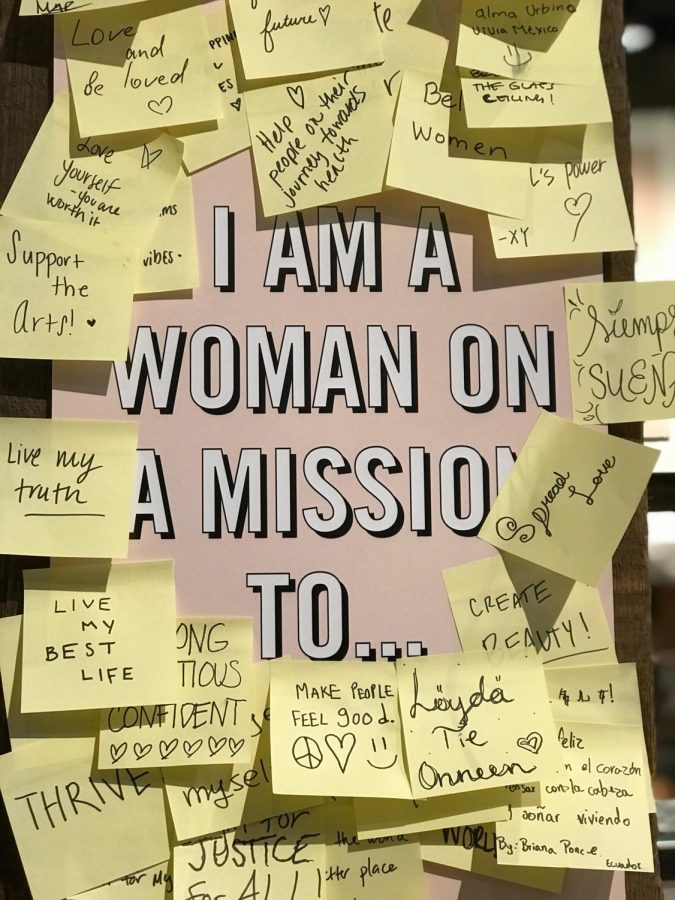Celebrating Women’s History Month
Women reflect on the past and present feminine experience
March is the annually declared month that highlights the female experience and celebrates the contributions of past and present women. Because of these women, women today are afforded opportunities and freedoms they might not have otherwise.
March 30, 2022
March, which is Women’s History Month, is a time to reflect on the female experience, and pay tribute to the courage of the women of past generations and to celebrate how their bravery afforded women today opportunities and freedom.
MC Gensheimer, director of Gannon University’s School of Communication and the Arts, said that as a child, there were never limits on what she could do as a female. Her father didn’t raise her with the expectation that women had different abilities than men, and Gensheimer learned at an early age to do things like shoot foul shots or kick a football over her house with her bare feet.
“I was taught very early on that I could do anything that anybody else could do,” Gensheimer said.
In Gensheimert’s early days as a teacher, it never occurred to her that the field of media was male dominated.
“We talk about the fact that as a child you believe things and as an adult you sometimes can change those beliefs because of the effects of the world,” Gensheimer said. “It was an odd thing to have a woman in the communications endeavor, but I never thought any differently about it. My dad gave me a good basis in that women were equal to men – the abilities were equal and there was no reason to think anything differently.”
Especially in the technologies, Gensheimer said that her role as a woman has always been on an equal footing with men. When she interviewed for her first job at Gannon, Paul Peterson, Ph.D., her interviewer, said that he would like to see more women in the fields of media and technology.
“I remember thinking, ‘Why can’t women be in the technologies?’” Gensheimer said. “I wasn’t an engineer, and I wasn’t a biochemist, but I think Peterson saw that the media was going to be a force in the future. I never thought about the fact that being a woman in the media or in the technology fields was anything unusual.”
When Gensheimer started at Gannon, most media classes were male dominated. Now, this is shifting. Part of this is because technology is shifting, making it easier for women to use the equipment necessary for creating and producing media, and part of this is also because of changes in legislation.
“Part of the technology has helped us as women enter fields that we might not have entered before, but I think also the work of the women in the ‘70s, the legislation and the laws that have helped, are now bearing fruit years later,” Gensheimer said. “Future generations of women are now reaping the benefits of women who wanted equal opportunities.”
Because of the constant ebbing and flowing of the technological field, Gensheimer said that women may be better at the changes that are necessary as a result.
“Women bring great gifts to the table, and in fact might be more adaptable in some ways when technology blows up,” Gensheimer said.
Gensheimer said that in her role as director of the School of Communication and the Arts, she has two primary tasks: to oversee and support student and faculty and staff work, and to attract new students to the program.
“It’s not a numbers game for me, it’s a human beings game,” Gensheimer said. “I’m not as budget-driven as maybe a male counterpart might have been, and I’m probably better at the human skills. As women, I think we have better communicative skills – we have strong intuitiveness, we have an ability to walk into a situation and listen better, and those kind of human skills have served me as a leader and would serve any woman.”
Gensheimer said that men and women need to join together to view both sexes as human beings, rather than compartmentalizing people into gender roles.
“Everybody is wonderfully, radically different from each other – it’s to look at the soul or spirit standing in front of you and say ‘What are your strengths? What do you bring to the table? Bring your gifts, and let’s use them.’ Both men and women,” Gensheimer said. “Those gifts, no matter what gender you are, help to solve the world’s problems. Our task is to figure out what’s broken and fix it, as communicators and people in the field.”
Ashley Caldwell, administrative secretary to the provost and vice president for Student Experience, said that as a woman, it is important to balance ambition and patience, because they are both important tools in a woman’s success toolkit.
“Ambition can take you where skill, resources and experience can’t, and patience will help you to take a step back and think critically in any situation,” Caldwell said. “There are always going to be obstacles and challenges in your life as well as people who are going to challenge you. Learn from those experiences — they will save you a lot of discomfort in the long run.”
Caldwell also said that it is important for women to invest substantial time in discovering who they are and what their goals are.
“When you build a strong foundation for yourself, you’ll increase your skill level, which leads to increased marketability and increased self-confidence, which makes you more comfortable owning your abilities and strengths,” Caldwell said.
This doesn’t mean that everything will come easy or that everyone will value those strengths, but rather, it means the knowledge that each step of the journey is toward specific goals.
“One thing I can say about my own personal journey is that I have always kept a positive attitude along the way even when the process didn’t quite make sense,” Caldwell said. “This helps me maintain control over my own journey when I feel challenged. I would much rather face a challenge with a smile and hope than anger or dread. You can’t always control why or when things happen, but you can control how you respond.”
This outlook came in part from Caldwell’s childhood. She had many experiences that afforded her opportunities to learn how to recover from adversity and failure.
Caldwell also stressed the importance of creating and maintaining a relationship with a positive mentor. This person is different from a friend – it is a relationship with clear boundaries that can help elevate an individual both personally and professionally.
“If you want something in life, you have to find the person who will share their journey with you,” Caldwell said. “The trick is figuring out what you are willing to do to get it. This will help you prioritize what is truly important in your life.”
One of these mentors for Caldwell was a high school friend. He helped her see a better way of life and showed her that it was possible to achieve her dreams. He had a convertible, and when Caldwell asked him how he was able to afford it, he told her it was through hard work and determination. From that day forward, Caldwell knew that was what it would take to achieve the things she dreamed of.
Caldwell also models her leadership after her husband, who was in the military for many years.
“He doesn’t tell people what they want to hear, he tells them what they need to hear,” Caldwell said. “His reliability and loyalty are leadership traits I really admire.”
It is also important to help others, Caldwell said. In the memory of St. Veronica and her merciful gesture at the sixth Station of the Cross – wiping the blood and sweat from the face of Jesus as he walked to Calvary for his crucifixion – Caldwell bases her authentic leadership style on relationships and the development of others. Caldwell even has a tattoo on her arm of a stained-glass window that depicts the sixth Station of the Cross.
“A lot of my personal leadership has been influenced by believing that we can imitate her loving and caring actions by doing all we can to help people,” Caldwell said. “I feel most successful in a leadership role when I help others achieve their goals. Any team that I am on, I usually lead from the back and I am happy to lead in that role. Having a title doesn’t make you a leader, having people that follow you does.”
Kathryn Dickey, a senior social major, has had a complicated experience as a woman. She grew up in a religious community, which had its perks, but also caused her ability to reconcile her identity as a woman to be muddied. Because of this, when she was graduating high school, Dickey was set on attending a large, public university. However, she ultimately ended up at Gannon.
“I think for a long time I viewed my femininity and my role as a woman in a conflicting light,” Dickey said. “I’ve actually learned a whole bunch more at Gannon about what it means to be myself than I might’ve learned elsewhere.”
As a woman who has taken on numerous leadership roles, Dickey said that it is sometimes difficult for women to be fully accepted as leaders in some spaces because of gender roles and expectations.
“I think sometimes we tell women that they have to be bigger and bolder if they want to be leaders, but that’s really just the binary that toxic masculinity has created for us – we didn’t have a ton of say in that,” Dickey said. “What we might see in the next couple of decades is a significant shift in how we define leadership and how we include women in that description, because I think some of our traditionally more feminine traits are only less profitable and less likely to be included in the leadership definition because men didn’t want it there.”
Women are also bombarded by unique societal and cultural expectations and pressures, making the feminine struggle and the struggle with mental health almost inseparable, Dickey said.
“People talk about mental health, still, like it’s a flu that you catch and that you have all of these weird physical symptoms, but nothing really changes with your identity or intersectional identities, and that’s not, in my experience, how mental health works, particularly for younger women,” Dickey said. “When we look at the overlapping stressors and experiences and lenses that create our mental well-being that create our mental health, you can’t really separate them. I encourage people to take a more holistic approach to gender and mental health – it’s harder and more tiring to think about all of the levels and layers to all of this, but it’s more deeply rooted in reality.”
Dickey said that as women, it’s easy to get blinded by movements rather than recognizing humanity.
“I think for a long time, we wanted men in positions of power to step up and argue for us, and that was often a disappointing experience,” Dickey said. “I think we have an obligation as humans to try and bring everybody up with us. It’s so easy to get distracted by other motives in leadership – there’s the awards, the money, the prestige – but the good thing to remind people is they can always come back.”
Dickey said when it comes to uplifting female voices, defending other women and making a point not to tear them down are the bare minimum.
Mentoring is also another important way to uplift other women.
“I think it’s really essential that women have the connections and the deeper relationships to be vulnerable about the issues they’re facing, and mentoring, when done right, is a great way to breed that vulnerability,” Dickey said.
“We need more spaces where people can bear their truth. You have to find people who are willing to join together in similar experiences.”
ANNA MALESIEWSKI






